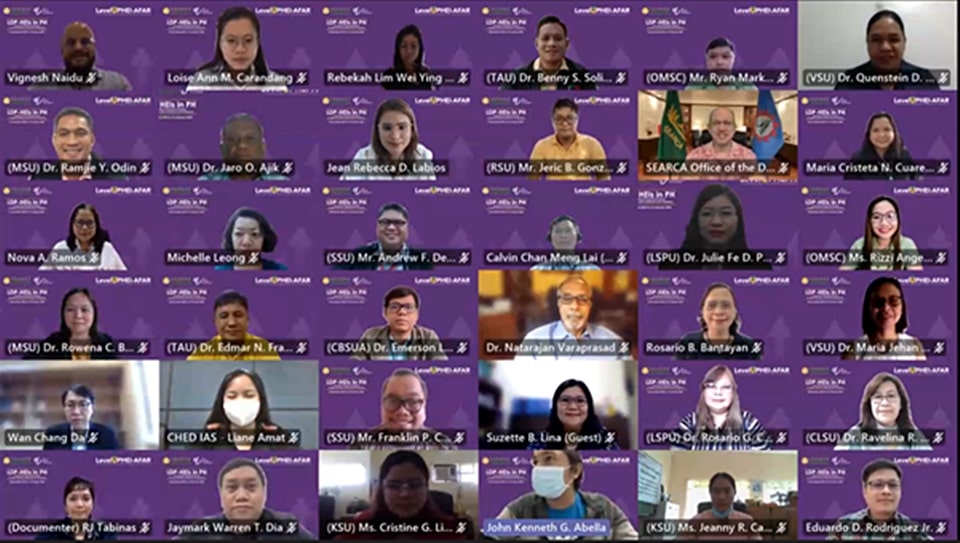Los Baños, Laguna, Philippines – To equip Philippine higher education institution (HEI) leaders with relevant skills and knowledge needed to lead resilient universities in the country, the Leadership Development Program for HEIs in the Philippines (LDP HEIs in PH) kicked off its opening ceremony and first session on 03 November 2022 with the overarching theme “Designing Your University’s Future.”
 Partners and Participations during the official opening of the 3rd LDP HEI in PH.
Partners and Participations during the official opening of the 3rd LDP HEI in PH.
The regional program is on its third in-country run organized through the collaborative efforts of the Southeast Asian Regional Center for Graduate Study and Research in Agriculture (SEARCA) and The HEAD Foundation (THF) in Singapore. LDP-HEI is a component of the project titled Leveling-Up Philippine Higher Education Institutions in Agriculture, Fisheries, and Natural Resources (LevelUPHEI AFAR) - a partnership between SEARCA and the Philippine Commission on Higher Education (CHED).
For this run, 26 middle to senior-level officials from 14 institutions who are members of the State Universities and Colleges – Association of Colleges of Agriculture in the Philippines, Inc. (SUC-ACAP) joined the program.
In her welcome message read by Ms. Maika Ela Aviso-Baguio, Lead of the Scholarships for Graduate Studies – Abroad and International Relations (SGSA-IR) Team of the CHED International Affairs Service (IAS), CHED Deputy Executive Director and International Affairs Service (IAS) Director, Attorney Lily Freida Milla, expressed gratitude to everyone who made the endeavor possible. Through the program, Atty. Milla hopes to empower leaders to become trailblazers in their own right. “The future belongs to you, and if this country has to move forward, it has to take off from you,” she emphasized.
For his part, Dr. Edgardo E. Tulin, SUC-ACAP President, believes the training to be an avenue for the participants to level up their skills in the key areas of leadership, specifically in the agriculture sector. Dr. Tulin hopes that the training will widen their horizons and deepen their understanding of a good leader. “You can be a change agent in your respective institutions with the new perspectives to empower the drive chains in your colleges or universities.” He further encouraged the participants to look into different strategies on how educational outcomes could be aligned with future needs.
On the other hand, Dr. Glenn B. Gregorio, SEARCA Director, took on the challenge of being the frontliner in agricultural education. Dr. Gregorio shared the need for HEIs to demonstrate abilities in taking social responsibilities and reforms not only to students and educators but also in the education system. He assured the participants that SEARCA, together with THF, will help provide the necessary tools and best practices for HEIs to upscale and step out.
Meanwhile, Dr. Wan Chang Da, THF Chief Executive Officer, emphasized how leadership is one of the most critical factors determining an HEI's effectiveness and success in fulfilling its potential and contributions to society. He noted that “understanding leadership with an eye of the future is extremely important.” He enjoined the participants to explore and reflect on leadership in HEIs moving into the future.
Dr. N Varaprasad, the Program Director and Lead Faculty of the training presented a brief overview of the workshop. He briefly ran through the six modules that have been structured and categorized into themes to design a university’s future. These themes include (a) envisioning the desired future (modules 1 and 2), which talks about the drivers of change, university outcomes, as well as the stakeholders; (b) the applicable educational outcome (modules 3 and 4), which covers the curriculum design and the evolution of university teaching and learning, among others; and the (c) required enablers (modules 5 and 6), which focus on faculty development and the involvement of stakeholders.
There are eight relevant outcomes that the program intends to engage participants in building their leadership and management capacities within the context of global challenges. The key components, however, are the participants themselves, as Dr. Varaprasad stressed.
Dr. Gregorio, delivered the first keynote address titled “The Changing Role of Universities in the Philippines.” He highlighted that the heart of an academic program is to adapt to the environment, that it should be demand-driven and not based on the needs of the higher ups. Dr. Gregorio also emphasized to “redefine agri-systems as food systems,” not only focused on production but as a cycle that includes a culture of business and entrepreneurship mindset.
Likewise, the balance between the planet and mankind needs to be considered in looking at solution-oriented strategies that fully maximize the human capital - to become more sustainable without heavily depending on the government. In addition, he indicated taking into consideration COVID-19 and the Sustainable Development Goals (SDGs), among others, in thinking and doing research.
“From farmer to trans-farmers,” Dr. Gregorio summarized that it is about transforming farmers to upgrade their skills to thrive in Agriculture 4.0. As educators, he challenged the participants to become transformative leaders to be able to help farmers transform themselves and their lives as well.
Dr. Calvin Chan, Director of the Office of Graduate Studies at the Singapore University of Social Sciences (SUSS), also facilitated a discussion on how to drive excellence in academia. He reiterated that vision without action is just a daydream. Using a quality framework and knowing how to leverage this is essential to move toward strategizing and planning. Dr. Chan further elaborated on using quality to achieve excellence, “in order for us to achieve excellence, the pursuit of quality has to be put in place” based on institutional vision, mission, and goals.
This 3rd LDP HEIs in PH is offered in a hybrid modality, with the first seven sessions to be held via the SEARCA Online Learning and Virtual Engagements (SOLVE) platform, and the final three sessions at the SEARCA Headquarters in Los Baños, Laguna, Philippines.